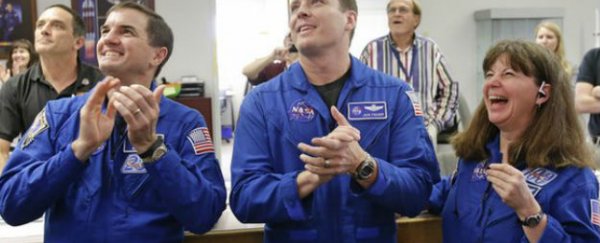Just off the coast of Mexico, the US Navy has recovered the NASA space capsule that will soon take human beings to Mars for the first time.
Orion completed its 4.5-hour test flight on Friday, orbiting the Earth twice at a height of about 5,800 kilometres to test a range of technologies such as its heat shield, launch abort system, and parachutes. According to Miriam Kramer at Space.com, 55 percent of the technology needed for a manned flight to Mars was tested during its maiden flight.
The capsule is expected to carry a four-person crew to an asteroid, followed by Mars, within the next two decades. NASA predicts the Orion crew will land on the Red Planet by mid-2030.
"There's your new spacecraft, America," mission control commentator Rob Navias said in a statement, as Orion splashed down.
"It's hard to have a better day than today," added Orion program manager, Mark Geyer. "In the sense that we are beginning a new mission, it is, I think, consistent with … the beginning of [the space] shuttle [program], the beginning of Apollo. It's a new mission for us starting in the region of the moon and beyond. I think it's in that same category. Certainly the team is excited at that level. We're going to learn a lot on this flight."
According to Jonathan Amos at BBC News, NASA estimates that the capsule reached speeds of almost 30,000km/hour as it entered the Earth's atmosphere, and the air its undersides came into contact with would have hit temperatures of around 2,000 degrees Celsius. This was ideal, seeing as one of the main aspects of this test mission was to see how the little spacecraft's heat shield would hold up.
NASA will continue to develop Orion, while at the same time building a powerful rocket, which will have its own unmanned test flight in either 2017 or 2018.
"That mission, dubbed Exploration Mission-1, will be the first flight of Orion with NASA's new mega rocket, the Space Launch System (SLS), currently in development. After that, Orion and SLS are expected to fly together again in 2021 for their first crewed mission," says Kramer at Space.com. "The Orion capsule cannot deliver astronauts to Mars on its own. The spacecraft will need to be outfitted with a functional service module and a habitat module in order to make a trip to the Red Planet comfortable for the four astronauts on the journey, officials have said."
Watch the launch and footage from Orion's first flight below:
